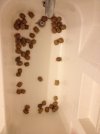It's been a very noticeable difference for me. As I've said before, my hatch rates for AI eggs are very low...less than 20% usually. Whereas the ones left in the ground take about twice as long to hatch out and hatch rates are around 100%. I have wondered how the prolonged incubation process, breaking of diapause, and overall conditions of the nests left in ground have influenced the differences I am seeing.
Even the age and maturity of the mothers I think might come into play as well. I'll be able to study that here in a few months after the first clutch of my female Jenny hatches out.
Even the age and maturity of the mothers I think might come into play as well. I'll be able to study that here in a few months after the first clutch of my female Jenny hatches out.
